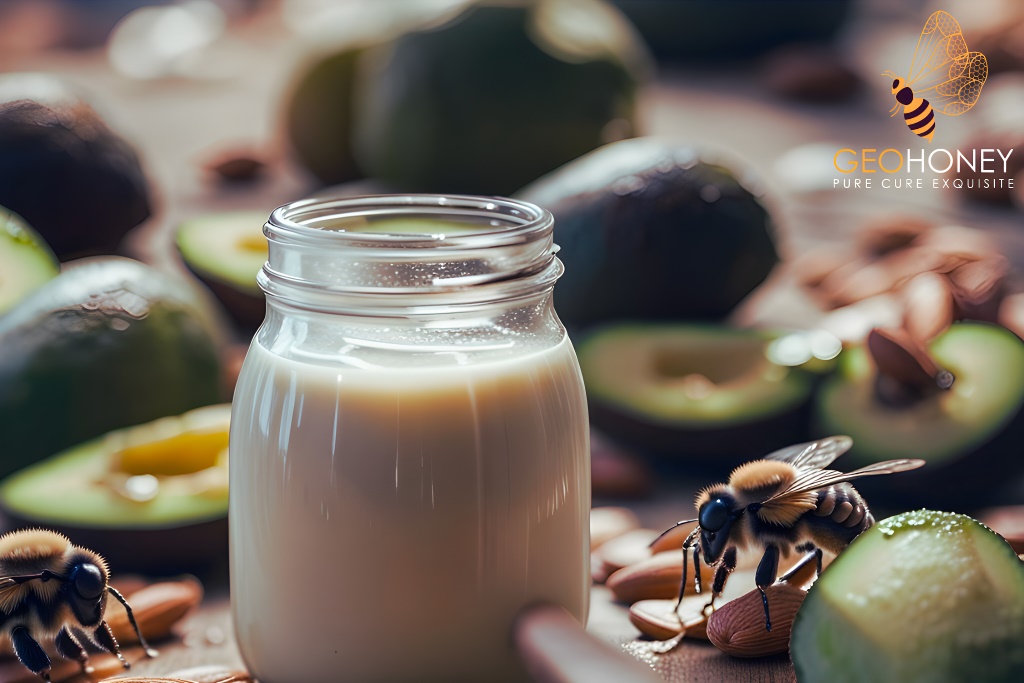- Tokyo: 03:37
- Singapore: 02:37
- Dubai: 22:37
- London: 18:37
- New York: 13:37
Examining the Link Between Avocado, Almond Milk, and Bees?

At first appearance, avocados and almonds do not appear to be harmful to bees; nevertheless, a closer examination of how these popular crops are grown suggests that they may have a negative impact on pollinators.
It turns out that bees are required to generate the majority of avocados and almonds in the United States. According to The Washington Post, honeybees pollinate the majority of the country's fruits and vegetables. With native bee populations in steep decline, there aren't enough of them to finish the job naturally or efficiently, according to The Washington Post.
Introducing migratory beekeeping. Farmers transport beehives with European honeybees across the country and into their fields so that the insects can pollinate crops during critical fruitful periods, according to The Washington Post. According to The Washington Post, farmers would lose one-third of their crops if this practice did not exist, including broccoli, blueberries, cherries, apples, melons and lettuce.
According to Tracy Reiman, a PETA spokeswoman, "average shoppers can't avoid produce that involves migratory beekeeping any more than they can avoid driving on asphalt," Vegan Life stated.
According to Scientific American, California's thriving almond business required 31 to 80 billion migrant honey bees per year to accomplish optimal pollination during the almond plants' two-week bloom. According to Scientific American, California produces up to 80% of the world's almonds and could not do so without migratory beekeeping.
According to From the Grapevine, American avocados rely entirely on bee pollination to bear fruit, thus producers have turned to migratory beekeeping to fill the hole left by wild populations.
Farmers in the United States have become reliant on the activity, yet it has been labelled exploitative and detrimental to bees. According to CNN, commercial beekeeping may damage or kill bees, and transferring them to pollinate crops appears to harm their health and lifespan. Because honeybees are forced to gather pollen and nectar from a single, monoculture crop — the one they were brought in to pollinate — they are deprived of their normal diet, which is more diverse and nourishing because it contains a variety of pollens and nectars, according to Scientific American.
According to Scientific American, being shuttled from crop to crop and field to field throughout the country swings the bees back and forth between feast and famine, especially once the flowers they were brought in to fertilise die.
Furthermore, the intentional mass influx of bees ensures the spread of viruses, mites, and fungi between the insects as they crash in midair and crawl over one other in their hives, according to Scientific American. According to CNN, some researchers believe this explains why so many bees die each winter, and even why entire hives die off suddenly in a phenomenon known as colony collapse disorder.
When pesticides enter the picture, bees have no chance. Many countries continue to use neonicotinoid pesticides (neonics), which are thought to be harmful to bees. The United Kingdom received controversy in January 2021 after permitting the emergency use of the poison on sugar beets, while promising not to increase its use in the aftermath of Brexit. Despite restrictions, this pesticide family is still the most frequently used in the United States, and scientists warn that the prolonged use of neonics might be disastrous for food supply, honeybee colonies, and mass die-offs of native species. According to academics and environmentalists, neonics are a major cause of the catastrophic honeybee and native bee deaths that occur each year.
Avocado plantations are being blamed directly for enormous bee fatalities in Columbia, according to Phys.org. Avocado exports from Columbia increased from 1.7 tonnes in 2014 to 44.5 tonnes in 2019, and Colombia will be Europe's leading avocado exporter by 2021, according to Phys.org. This growth has increased the use of the neonic pesticide fipronil. Fipronil is still used in Colombia to grow avocados and citrus for export, despite being banned in Europe and limited in the United States and China. This has harmed nearby bees, who become poisoned as they buzz through pesticide-treated plants in search of food.
"They bring this poison to the hive and kill everyone else," Columbian beekeeper Abdon Salazar bemoaned to Phys.org after losing 800 hives and 80 million bees in the last two years.
According to Phys.org, Salazar and other Columbian beekeepers have reported "scooping up piles of dead bees" year after year since the avocado and citrus booms began. Many have chosen to rescue what few incomplete colonies remain and relocate away from agricultural regions.
Pollinators and the crops they help build face an uncertain future. According to the United Nations, over half of all insect pollinators, mainly bees and butterflies, face extinction, according to Phys.org. Their collapse is already having a knock-on effect on the economy and beyond. According to Phys.org, bees and other pollinators provide free fertilisation services worth billions of dollars to around 1.4 billion jobs and three-quarters of all crops worldwide. The extinction of wild and native bees may pose a threat to food security.
"The bee is a bioindicator," Salazar, the beekeeper, told Phys.org. What other insects that are good to the ecosystem... are dying if bees are dying?"
Source: ecowatch.com



